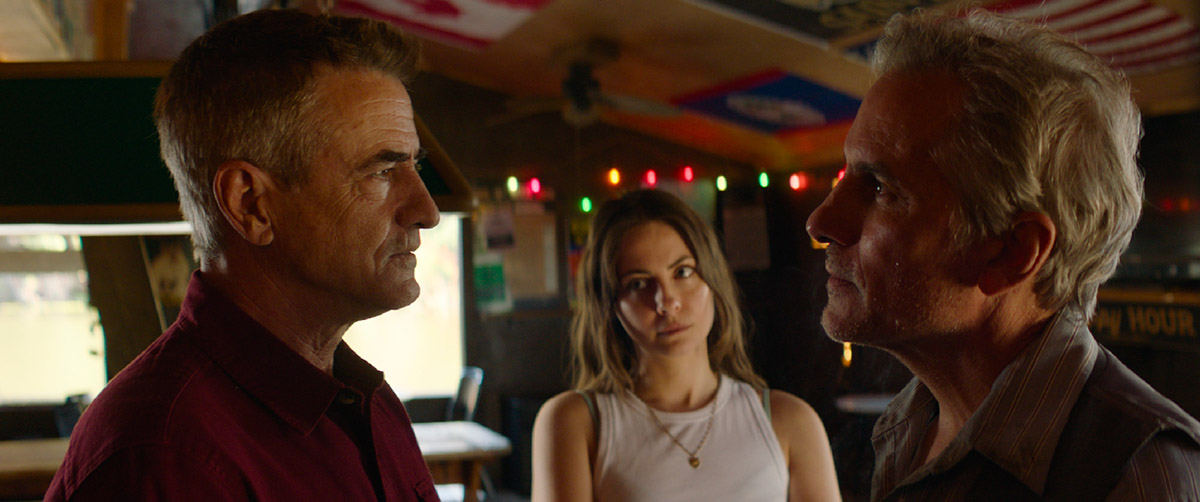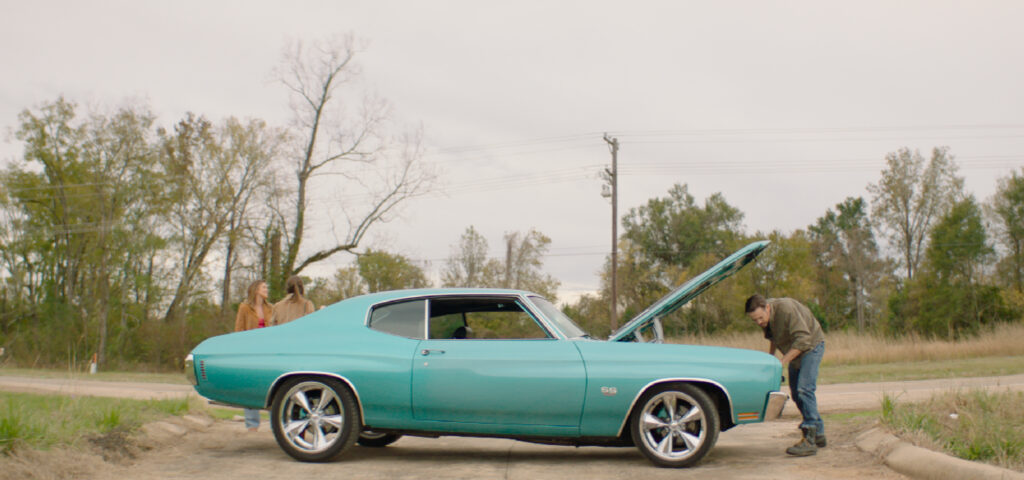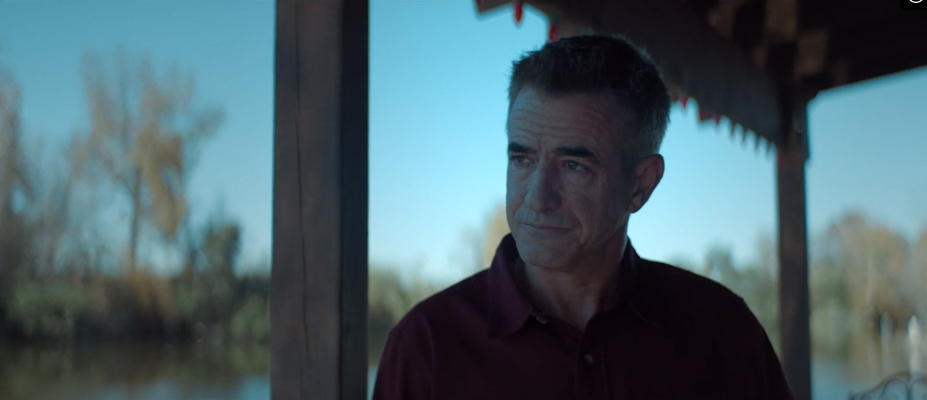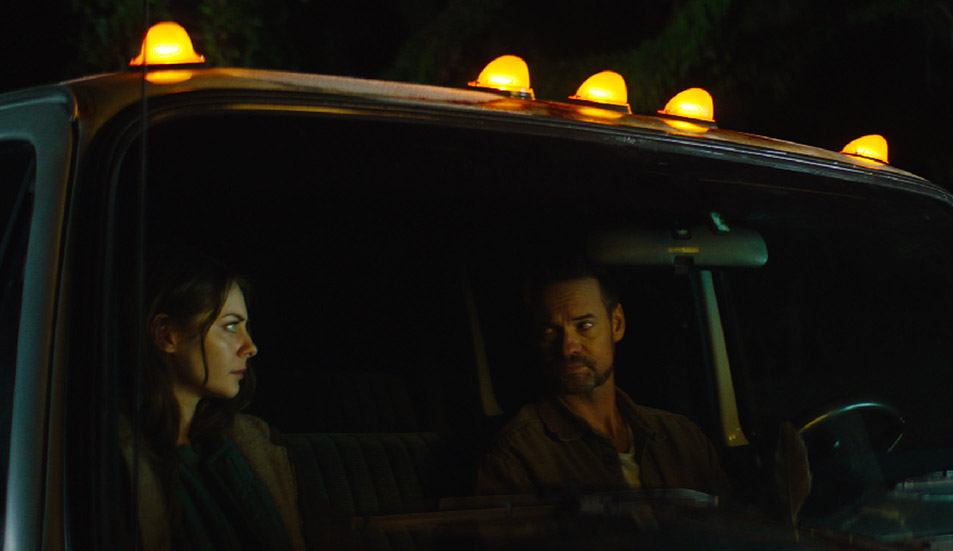Our chat with Yerby was a blast. We talked about his journey to writing The Dirty South – which included over 100 rewrites! He shared what it was like working with Willa Holland, Shane West, and Dermot Mulroney and what it was like and filming in Natchitoches, Louisiana. We talked about Yerby’s Louisiana roots and behind-the-scenes details on the production of The Dirty South, including how stunt coordinator Mike Yahn helped make some of the film’s iconic moments. We even asked Yerby’s reaction to the standing ovation and awards at the Chelsea Film Festival.
The Story of The Dirty South
The story of The Dirty South is gritty. Sue Parker (Willa Holland) is in deep trouble. Her family’s bar is on the verge of collapse, thanks to her neglectful father and a ruthless tycoon (Dermot Mulroney) with a grudge over “small town bull____.” Faced with an impossible bill come due, Sue has no time to lose, and she’s running out of options to save things. But then, a handsome drifter named Dion (Shane West) walks into her life. He’s charming and confident, and Sue sees him as her only chance to save her family’s bar and herself. What starts as a simple plan quickly spirals out of control. Sue and Dion are caught in a web of larceny, lawlessness, and deadly consequences.

The Interview
[Editor’s Note: This interview has been lightly edited for clarity. There are mild spoilers ahead for The Dirty South. ]
Ayla Ruby: Hi. It’s nice to meet you.
Matthew Yerby: Likewise. Happy Halloween.
Ayla Ruby: Happy Halloween, yeah. So, can you talk about your journey from, I guess, you kind of staffed to indie filmmaker? Because you went out in LA?
Matthew Yerby: Yeah. I’ve never been staffed. I started writing about 15 years ago, and I actually found a mentor. Her name is Eva Contis. She’s an editor, and she has been helping me for years. I produced a screenplay for her, produced a film for her, and that was the main reason she told me that; she said, “That’s going to be the best way that’s going to improve your writing is come over here and make a film with me. You’ll see it.” And so once I produced a film, acting, it just wasn’t as cool anymore, and I just realized I want to write stories to tell them. This is the way that I can paint, and I can do it on the screen.
Matthew Yerby: And I did. I began writing, and I wrote 12 feature-length screenplays before I landed on The Dirty South. The Dirty South went probably over a hundred rewrites only because it took four years to actually cast the film. I just knew that I wasn’t going to move on to another screenplay until this one made it to the screen.
Ayla Ruby: Yeah. I think I read a little bit about it, and the film was originally called Runaround Sue. Is that right?
Matthew Yerby: It actually was. What started this, my father passed away in 2017, and all his music was from the ’60s. And two of his favorite songs were from the same artist, Dion DiMucci, and one of them was called Runaround Sue, and one of them was called The Wanderer. And Runaround Sue is about a girl who breaks every guy’s hearts, and I asked the question, “Why does she break people’s hearts?” And it’s because she has no time. A lot of times, whenever a man … When a woman doesn’t have time for any man, every one of them want her.
Matthew Yerby: And so the other one is about, The Wanderer is about a man that roams from town to town in his car, and he’s got two fists of iron, and he’s got every woman that he wants. I asked the question is, “Why is he on the run?” So I created that in the story, and it was only because I wanted the characters: the woman who breaks every guy’s heart meets the guy that can get any woman he wants. And I just from there, that’s where the screenplay, at least it was inspired. And from there. I chose the town of Natchitoches because I knew I could produce a great story there, and I wrote about characters in the world that I grew up living in.
Ayla Ruby: Now, you’re originally from Natchitoches, right?
Matthew Yerby: I grew up right down the road in Winnfield. It’s about 30 miles, and I played baseball in Natchitoches whenever I came to college. I also worked at the bar [The Point Place Marina]that we shot in.
Ayla Ruby: Oh, wow.
Matthew Yerby: Yeah. That was my main connection there. I knew that if we got that bar, that the majority of the film was already taken care of.
On the evolving script
Ayla Ruby: Now, I know the script was originally set; I think it was set in summer, and you guys filmed in winter. Can you talk about that change and any other changes from how you mentioned a hundred-some rewrites, what that evolution was like because I’m curious.
Matthew Yerby: The rewrites, yeah, the rewrites didn’t even stop on set. So it was supposed to be a summer film, but we had four actors to get available at the same time, and we couldn’t have that happen until the end of November. And three days before we started shooting, it went to 29 degrees. That is so cold in Louisiana; it’s like wet cold. And so all of the wardrobe had to change right there. That moment is like, “Okay, this is a different movie now.” And because we were actually shooting, there’s a festival that goes on in Natchitoches, Louisiana, every year called The Festival of Old Lights, and that was not written in the script. But because we were shooting during, it was like, “Okay, this is now, we’re going to find a way to get this into the script.”

Matthew Yerby: But other changes, working with old cars and old trucks, on cold mornings, sometimes they don’t start. So the scene that they’re on the side of the road, that car was actually broke down. We couldn’t get it to start that morning, so we moved to the side of the road. The scene was supposed to take place in the car, but we moved it to the road, and actually, it worked even better.
On working with Willa Holland
Ayla Ruby: Fantastic. So this is kind of Westerny, and there’s a very strong woman lead. There’s Willa Holland is Sue. Can you talk about the choice to have a woman featured in this crime western and what that was like?
Matthew Yerby: I really love films where there is a tough lead female, and I wanted to create one, but with a Southern voice. I wanted to create one that just wasn’t born rich, that was actually born with struggle. And also, she didn’t have a choice of what she was going to do with her life. She has a no-show mother a father that is completely drunk, but she has to run his bar and has to pretty much play mother and everything because she has a younger brother at home. Nobody else is going to keep the lights on at that house. She has to.

Matthew Yerby: And so, creating this Western-style feel, I knew it was important to choose an actress, to find the correct actress that was going to bring this kind of intensity, that has so much force behind her, but is also so tender and loving whenever she needs to be. I really did; I had so much fun working with Willa Holland because she’s an incredible writer, and she knows exactly how to get to the meat of every line. We would speak before each scene, and she would ask permission every time; she didn’t have to, but she’s like, “Hey, I think this thing means this.” It’s like, “Go for it.” And I use more of her first takes than anybody else in the film.
On what Sue goes through in The Dirty South
Ayla Ruby: What I really appreciated just watching the story unfold was how active she was as a character. She didn’t let things happen to her. She kind of took, I don’t want to say, took charge, but she was driving that narrative in so many ways. And I was wondering if you could talk about her arc and what she goes through in the film and really if she represents anything, just if you could talk more about that.
Matthew Yerby: Yeah. Sue (Willa Holland), when we first meet her, she is a person that her basic everyday life is truly just getting everything taken care of. She has to run the entire house; she has to run the entire bar; she has to get her brother to school on time; she has to do all the things. And she says she doesn’t have time for a man, which is true the entire film.
Ayla Ruby: Like the song.
Matthew Yerby: Exactly, exactly. So, the entire time, she has three days to get $30,000. Every man in the world in that small town wants Sue, but she doesn’t have time; she has no time for them. She’s got a tough family, but throughout the journey, she finds that family can sometimes be more than just blood. Sometimes, you can choose your family because sometimes people will choose you. And I think one of the greatest parts of her arc is allowing somebody to choose her. She’s never been chosen her entire life; she’s never had somebody just be there for her, and it’s difficult for her. But by the end of the film, the lessons that she learned through it is of the family that she truly wants; she chose them.
On working with Shane West and Dermot Mulroney
Ayla Ruby: So we’ve talked about Sue, but can you also talk about, you have Shane West, you have Dermot Mulroney. Can you talk about how they came into the project? Did the characters evolve at all with the actors? What was that like?

Matthew Yerby: Shane is actually a Louisiana boy. He’s from Baton Rouge. And Dion, when I was writing, he was supposed to have this such brooding presence, but also be so charismatic and also super tender. Shane West, I couldn’t have found somebody better. He is the most brooding actor that I know, and I was so impressed with his athletic ability with his fight scenes. Shane is an incredible athlete, and he was such a professional before we even hollered “Places,” he was on his mark every time; he knew every one of his lines. Every idea that he had, I’d always tell him, “Hey, man. You take that out, you go,” and he did. He brought just an extra few moments that really, really helped the middle of the film.

Matthew Yerby: And Dermot Mulroney, I think we’ve all met a guy that is, we’ve met that character, just the most powerful man in town that everybody’s scared of him. He owns everything, and he knows everybody’s scared of him. And Dermot’s such a professional.
Matthew Yerby: What’s funny is that character is … And also, the day that Dermot Mulroney showed up on set, everybody knew. Our crew was on point; every actor was ready to go. And it made me realize he is this character; he is this powerful man that walks into this town, and everybody knows. And it was so fun just to watch him work. Dermot loves to; he doesn’t want to cut the camera, Just keep going. Nope He would deliver a line, take a moment, deliver it again, and he just knows what the director’s going to need. I’m so impressed with him. It was such a pleasure to work with.
On how long it took to film
Ayla Ruby: So you mentioned you filmed in November. How long did it take to film? Because you mentioned the fights, you’ve got obviously a lot going on, and it’s amazing. By the way, I lived in Baton Rouge, and I lived in Mississippi, so I love this film so much.
Matthew Yerby: Awesome. I was actually born in Mississippi, and I was raised in Louisiana. But we actually shot this in 15 days with principal actors. Yeah, there were days we were shooting 9 to 10 pages a day. And there were a lot of locations in this film, there’s a lot going on, but we had money for 15 days with this cast. We had two extra days for some B-roll stuff, but overall 17 days to shoot this.
On the stunts and fight choreography of The Dirty South
Ayla Ruby: That’s phenomenal. Can you talk, so back to the fights, back to the stunts, so they’re very physical, right? There’s the scene at the gas station; there’s the scene at the end with Sue. Can you talk about what that process was like, conceptualizing that, and if it was any different than what it was realized on screen? Because I’m just amazed by the choreography and all of that.
Matthew Yerby: Yeah. Every fight was written. Every fight written in the script, pretty much I left it very open. I always said, “Fight scene,” and actually, I would show what the ending of that fight was. Now, the stunt coordinator we worked with, Mike [Yahn], he was truly incredible. He actually talked me … So, in the car chase scene, there was supposed to be another oncoming tractor that they dart in front of, but he convinced me to take into; instead of trying to pass in front of this tractor, he actually talked me into having our car take a left turn.

On what it was like to get the reaction at the Chelsea Film Festival
Ayla Ruby: Okay. So the film was just on the big screen, right? You just had it at the Chelsea Film Festival, black-tie audience. Can you talk about what that was like for you as just an artist and creative? Because …
Matthew Yerby: Never would I have ever expected that in my life, but it was one of the most incredible experiences of my entire life. I would’ve never thought we would’ve gotten a black-tie premiere for this film. And in Manhattan, New York, to say the least, there’s such an incredible festival with Chelsea, but to have a standing ovation on your first film, this was a very, it was just an incredible night. My mother was there; there were 30 people from the town of Natchitoches, Louisiana, that took off in the middle of the week to come up there, rent a tux, rent gowns. It was incredible.
On the message of The Dirty South
Ayla Ruby: So, what do you want people to know? If there was only one thing they could know about The Dirty South, what would you want them to know and take away be?
Matthew Yerby: I want people to take away that family has always got your back. And it doesn’t matter who your family is or what they’ve done or where they’re at in this part of life; they may be totally lost, but when everything really, when the shit hits the fan, your family’s got your back, and they’re going to have your back always. And definitely, in the South, that’s exactly the way that we do.
Ayla Ruby: Awesome. Is there anything coming up for you next after this film, or are you just kind of focused totally on …
Matthew Yerby: No, I’m days away from finishing a first draft of … It’s actually a holiday thriller titled Christmas Eve. I know. It’s still very much of a thriller, but it takes place on one night in three locations.
Ayla Ruby: I think we still have time, so I’m going to talk still if that’s okay.
Matthew Yerby: Yeah, of course.
On parallels between painting with acryllic and painting on screen
Ayla Ruby: I always love to … You’re an artist, right? Can you talk about, are there any parallels? You kind of alluded to it earlier, are there parallels between painting with actual physical things versus painting with words, painting on the screen? Because it seems like there could be similarities.
Matthew Yerby: Absolutely. Everything is very true in there. A blank canvas is just like a blank cursor, a blinking cursor. Every artist has a structure of what they know where they want this project to end. They’re open to changing, but they know kind of where they want it to end. Same thing with a film. There is a structure, and the biggest difference is that with an artist, in my artistry, I am painting alone. Sometimes when I paint murals, I’m actually working with other people, and it is about collective creativity, but with every film, it’s about artists working together to produce a final result.
Matthew Yerby: But the way that you paint with words is the same. I mean, it is truly the same as painting with acrylic. You have a structure, you know the direction you want to go, and you don’t stop until it’s finished. And it’s okay; the best thing about whether or not you think it’s finished, you can always go back to it; you can always make it better. And in that case, that was definitely, that was the process for us.
Ayla Ruby: Well, I think that’s a lovely note to end on. But thank you so much for chatting. The film was absolutely delightful, and I really loved it.
Matthew Yerby: Thank you. I really appreciate you.
A note about The Dirty South and SAG-AFTRA
The team behind The Dirty South asked us to include this note about the film given the ongoing SAG-AFTRA strike, and we wholeheartedly agree with the sentiment. It is verbatim below.
“SAG-AFTRA has approved an interim agreement for The Dirty South since the film is being released by Cineverse, an independent, non-AMPTP affiliated distributor. Under the terms, members “may work on these productions without being in violation of the strike order,” per the guild. The entire team of The Dirty South expresses their gratitude to SAG-AFTRA for allowing the cast to promote The Dirty South during this challenging time for the industry.”
How to Watch The Dirty South
The Dirty South will be in select theaters nationwide starting Friday, November 10th. It’ll also be available on demand for you to stream at leisure.
Our full thoughts on the film and why we love it so much will be available in a review later this week.
Your thoughts on The Dirty South
What do you think about The Dirty South? Do you have thoughts you want to share? Join the conversation by commenting below or following us on X (formerly known as Twitter) @MoviesWeTexted.
Are you still trying to find something to watch this weekend? Check out our editorial on the new Marvel Spotlight Banner. You could also check out contributor Austin Belzer’s review of the Five Nights at Freddy’s movie or Russell Miller’s thoughts on the new Sofia Coppola film Priscilla.

